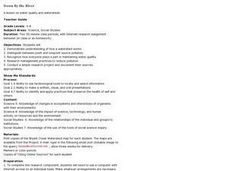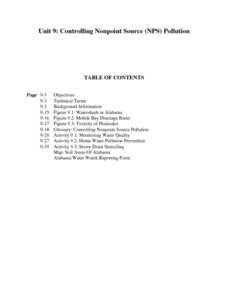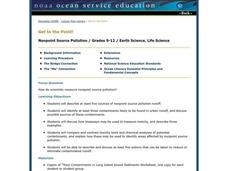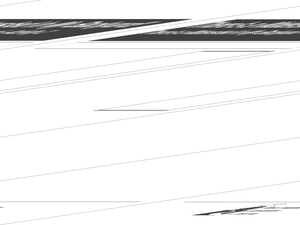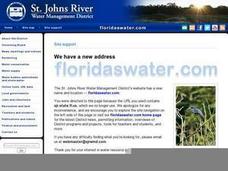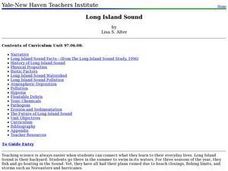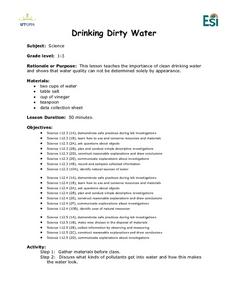Curated OER
Down By the River
Students examine how watersheds work and determine the difference between point and nonpoint source pollution. They research management practices to reduce pollution and investigate how everyone can participate in reducing water pollution.
Curated OER
Watershed Protection
Learners explore environmental care by participating in an Earth science activity. In this clean water lesson, students discuss what a watershed is, how they become polluted, and how it affects the overall quality of drinking water....
Curated OER
Controlling Nonpoint Source Pollution
Learners examine factors affecting water quality. They test water in a local body of water to determine its quality. They collect data and continue monitoring the water monthly. They assess water quality in the home and on the farm.
Curated OER
Salt Marsh in a Pan
Students create a model of a salt marsh to discover the impact of pollution and human activities on water-based habitats including bays and the ocean. They recognize the relationship between natural and developed areas. Students impact...
Curated OER
All Hands on Deck: A Harbor Education Program
Students build a model of an estuary. In this wetland lesson, students build a model estuary with a paint tray and modeling clay. They use the model to illustrate the impact of non-point pollution on the watershed.
Curated OER
Get to the Point!
Students write out sources of pollution and identify contaminants are most likely found in urban runoff. In this pollution lesson students compare toxicity tests and chemical analysis of potential contaminants.
Curated OER
Water Pollution Graphing Activity
Young scholars describe and identify the link between land use activities within a watershed and water quality. They evaluate the quality of a "water sample" ( a bag of skittles), graph their results, and form a hypothesis about the land...
Curated OER
Dirty Water
Students, through a case study of actual water sources in Washington State, identify major sources of aquatic pollution. They also categorize pollutants, make inferences about the effects of pollutants on the environment and construct...
Curated OER
Liquid Assets: Watershed
Learners watch videos and create a representation of their watershed. In this water resources and pollution lesson, students watch three short videos and discuss them. They use ordinary objects to create a model of their watershed.
Curated OER
Leach Out and Touch Someone
Students discuss how groundwater becomes polluted. In groups, they design and create models of groundwater pollution sources. They demonstrate to the class how the water may become contaminated from local and nonlocal pollution sources.
Carnegie Mellon University
Hydroelectricity
Use a simple PowerPoint presentation to introduce you environmental studies class to hydropower. Hold a debate about the pros and cons of developing this form of alternative energy. Power up your class with this simple lesson on a topic...
Curated OER
Are You Thirsty: The Effects of Pollution on Drinking Water
Students discuss the different causes of water pollution. In this ecology lesson, students brainstorm ways to purify polluted water. They formulate their conclusion based on the results of the experiments.
Curated OER
What Are We?
Students describe different types of water pollutants. They complete experiments in which they observe the affects of water pollution on algae. They also brainstorm and list three causes of each water pollutant.
Curated OER
Groundwater Modeling
High schoolers evaluate the effects of point and non-pointy sources of water pollution using a model. They assess human impact on water quality. Students build a model which represents an aspect of the hydrosphere and compare their model...
Curated OER
Water, Water, Everywhere (High School)
Pupils view different types of water to make the point that salt or polluted water isn't useful for drinking water. They chart causes, consequences and solutions to water scarcity based on internet research. They write an essay as...
Curated OER
TE Activity: Pollution Politics
Students examine how a bill becomes a law in the US Congress. They investigate legislation about global warming. They determine the role of engineers as they educate Congress, the public and other government institutions about global...
Curated OER
There's a Watershed in my Backyard!
Students explain what the term watershed is by creating a model. In this science, geography lesson, students demonstrate how the water moves in a watershed. Additionally, students learn about point source and nonpoint source pollution....
Curated OER
Moving without Wheels
Students observe a simple water cycle model to better understand its role in pollutant transport. This activity shows one way in which pollution is affected by the water cycle; it simulates a point source of pollution in a lake and the...
Curated OER
Stream Watch
Young scholars discuss why it is important to take care of streams, what is non-point source and point source pollution, what are some causes of pollution in streams, and what can we do to prevent some of these causes of pollution? They...
Teach Engineering
Introduction to Environmental Engineering
A series on environmental engineering introduces the class to issues that environmental engineers work to solve. This first lesson focuses on air and land issues, and looks at ways to reduce pollution.
Curated OER
Lesson 11 - Potable Water
Pupils investigate the meaning of potable water and water reuse. They define water quality and quantity problems. They complete worksheets, a quiz and design a poster.
Curated OER
Long Island Sound
Students use the Internet to research the history of Long Island Sound. In groups, they identify the sources of point and nonpoint pollution and how humans are impacting the area. After watching a video, they discuss the role of...
Curated OER
Drinking Dirty Water
Students consider the importance of clean drinking water. They conduct a taste experiment with water, adding incremental drips of salt and vinegar to determine at which point it doesn't taste drinkable.
Curated OER
To Protect Your Streams, Protect Your Mountains
Students build and experiment with a watershed to understand the effects of pollution. In this movement of water lesson, students work in groups creating rock formations and change the viscosity of the liquids falling down the mountain....


